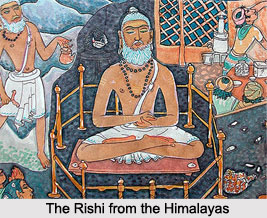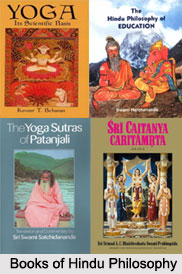 The history of Hindu Philosophy goes back to the earliest times, when systems of ritual using Yoga and meditation, elaborate and often highly sophisticated doctrinal schemes and metaphysical speculation developed within Hinduism. However, from around 700 B.C proto-philosophical period, when karma and liberation doctrines bloomed, the proto-scientific ontological lists in the Upanishads were compiled. Subsequently was the advent of classical period, spanning the first millennium ad, in which there was constant philosophical swap between dissimilar Hindu, Buddhist and Jain schools. While there are undoubted similarities between traditional Hindu thinking and modern western philosophy, what traditional Hindu thinkers do would only be partially recognized in contemporary departments of philosophy in western universities.
The history of Hindu Philosophy goes back to the earliest times, when systems of ritual using Yoga and meditation, elaborate and often highly sophisticated doctrinal schemes and metaphysical speculation developed within Hinduism. However, from around 700 B.C proto-philosophical period, when karma and liberation doctrines bloomed, the proto-scientific ontological lists in the Upanishads were compiled. Subsequently was the advent of classical period, spanning the first millennium ad, in which there was constant philosophical swap between dissimilar Hindu, Buddhist and Jain schools. While there are undoubted similarities between traditional Hindu thinking and modern western philosophy, what traditional Hindu thinkers do would only be partially recognized in contemporary departments of philosophy in western universities.
While the flowering of Hindu philosophy and theology occurs between the seventh and seventeenth centuries CE, the origins of philosophical speculation go back to the Vedas. The primal rhapsodies of the Hindu philosophers concerned metaphysics, epistemological issues, philosophy of language, and ethical philosophy. Distinguished by their alternative approaches to reality, all the schools considered the Vedas (the sacred scriptures) authoritative, and all believed that there is an eternal individual self or atman, apart of the larger entity Brahman and Hindu philosophy discerns such
Nasadiya Sukta (Creation Hymn) of the Rig Veda unfolds:
Who really knows?
Who will here proclaim it?
Whence was it produced? Whence is this creation?
The gods came afterwards, with the creation of this universe.
Who then knows whence it has arisen?
The Rig-Veda thus letting an individual seeks and discovers the meaning of his life in his adjourning quest, highlights the philosophy of life and transcendence.
 Hindu philosophy is classified into six schools of thought, known as Darshanas. Samkhya philosophy is a strongly dualist theoretical exposition of mind and matter. Yoga philosophy emphasizes meditation closely based on Samkhya. Nyaya philosophy and Vaisheshika, an empiricist school of atomism relate to Hindu philosophy. Mimamsa is an anti-ascetic and anti-mysticism school of orthopraxy, while Vedanta and opposes Vedic ritualism in favour of mysticism.
Hindu philosophy is classified into six schools of thought, known as Darshanas. Samkhya philosophy is a strongly dualist theoretical exposition of mind and matter. Yoga philosophy emphasizes meditation closely based on Samkhya. Nyaya philosophy and Vaisheshika, an empiricist school of atomism relate to Hindu philosophy. Mimamsa is an anti-ascetic and anti-mysticism school of orthopraxy, while Vedanta and opposes Vedic ritualism in favour of mysticism.
In the history of Hindu philosophy, the distinction of these six philosophical schools existed in the Gupta period, the `Golden Age` of Hinduism. With the disappearance of Vaisheshika and Mimamsa, it was archaic by the later middle ages. Eventually the various sub-schools of Vedanta, like the Dvaita `dualism`, Advaita `non-dualism` and others came to prominence as the main partition of religious philosophy. Nyaya survived into the 17th century as Navya Nyaya `Neo-Nyaya`, however Samkhya gradually lost its status as an independent school and its doctrine absorbed into Yoga and Vedanta.
In Hindu philosophy, Yoga is the name of one of the six orthodox philosophical schools and the Yoga philosophical system is intimately associated with the Samkhya School. The Yoga school as explained by Patanjali concept, it is related to the Samkhya psychology and metaphysics, but is more theistic than the Samkhya. The Nyaya School is based on the Nyaya Sutra and was written by Aksapada Gautama.
The Hindu philosophy includes the thoughts of the Upanishads that are referred to as the Vedanta, the `end of the Veda`. This is a term which is also used for the theological tradition developing from them. This immensely rich tradition is so influential that, at a popular level in the West, `Vedanta` is taken to be Indian philosophy par excellence. The Vedanta tradition is, however, divided into two main developments which are both referred to as schools of exegesis or enquiry (mimamsa). Advaita is probably the most recognized of all Vedanta schools of Hindu philosophy. Three categories of existence, namely Brahman, soul, and matter are followed by this school of thought. Shuddhadvaita by Vallabhacharya and Achintya Bheda Abheda by Chaitanya Mahaprabhu were the important thoughts of Hindu philosophy in later ages.
The most influential school of theology in India has been the Vedanta, exerting enormous influence on all religious traditions and becoming the central ideology of the Hindu Renaissance in the nineteenth century. It has become the philosophical paradigm of Hinduism par excellence. Hindu philosophy with its entire reality, spirituality, theories of creation is one of the colossal and unlimited areas of cultivation and research for the Indian scholars. The different schools of thoughts still prevail in different sects of the nation.












